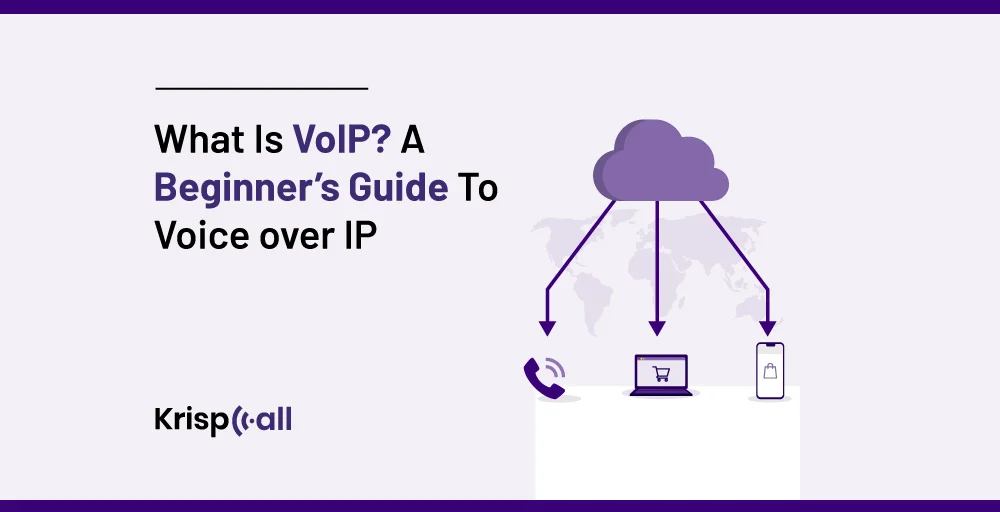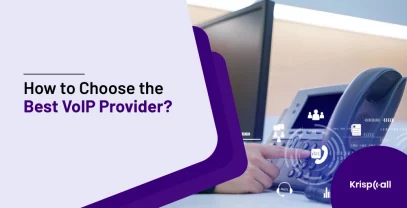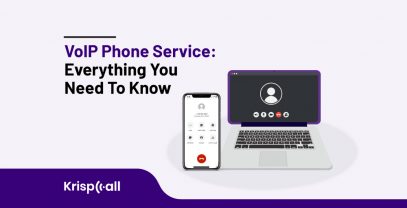Traditional phone systems have served users for a really long time. Though they’ve got their robustness, as of now, they are failing to meet the needs of the modern generation that wants everything fast-paced, easy to use & access, and on their hands.
Well, this lack of capability, expensiveness, and flexibility leads to people experiencing increased frustration. That is why they begin looking for alternatives or better options.
And with the modern solution, Voice over Internet Protocol (VoIP), these outdated problems can be solved.
In this blog, we’ll explore what is VoIP and how it works to make calls efficient in organizations or personal settings. 🎉
🔑 KEY HIGHLIGHTS
- VoIP (Voice over Internet Protocol) is a technology that allows users to make and receive voice calls over the Internet.
- VoIP is used to make phone calls over the Internet instead of using traditional phone lines.
- VoIP works by converting your voice into a digital format, compressed, and sent over the Internet so that you can listen as an outcome.
- You can have many advantages, such as lower prices, advanced VoIP features, remote accessibility, cost savings, and better call quality with VoIP.
- VoIP offers many advanced features like auto attendant, unified communication, mobile and desktop apps, and call recording.
What is VoIP?
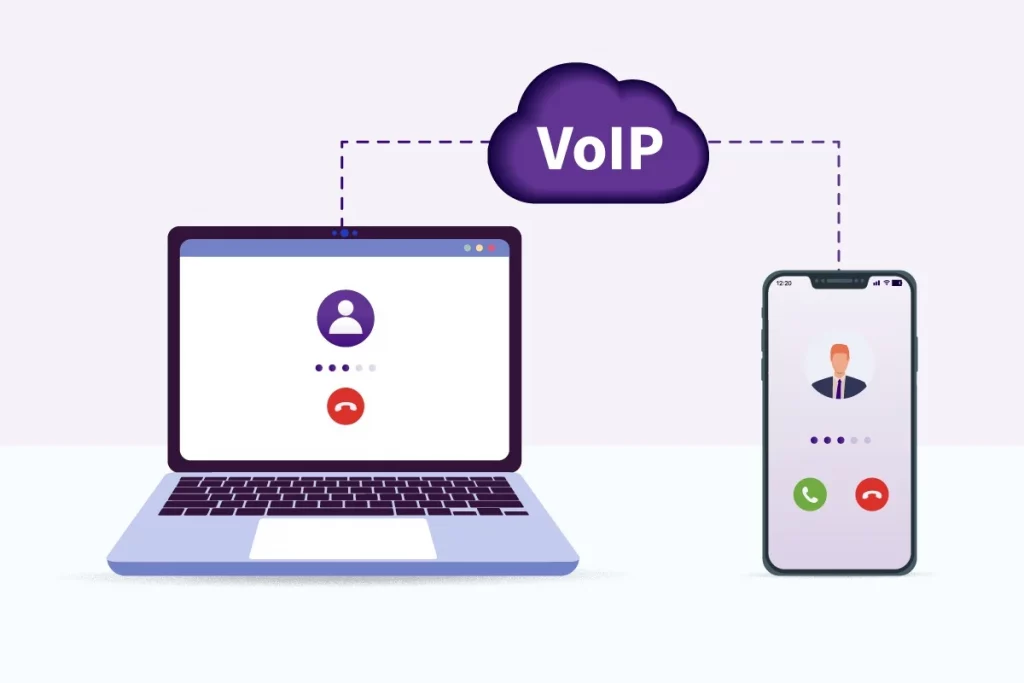
VoIP (Voice over Internet Protocol) is a technology that allows users to make and receive voice calls over the Internet. Using VoIP, users can make voice calls from their computers, smartphones, other mobile devices, VoIP phones, and browsers that support WebRTC.
Moreover, Voice over IP (VoIP) is used by phone providers to provide phone services to their customers, which eliminates the need for users to install and maintain physical phone systems. Furthermore, it provides advanced features that landlines don’t normally have, which makes VoIP an excellent choice for making and receiving high-quality calls.
What is VoIP Used for?
VoIP is used especially for making phone calls over the Internet. It is mainly used by individuals and organizations as it facilitates advanced features like virtual meetings, conferencing, and messaging.
Moreover, it is not limited to just that; by utilizing VoIP, you can also have unified communication by integrating various communication methods into a single platform.
Still wondering who can use this technology? According to Founderjar, in particular, 63% of startups, 34% of SMEs, and 32% of large-scale organizations use business VoIP software.
Based on the data, we can say that it is used by organizations of all sizes to fulfill their own communication needs, ranging from personal calls to complex business communications.
How Does VoIP Work?
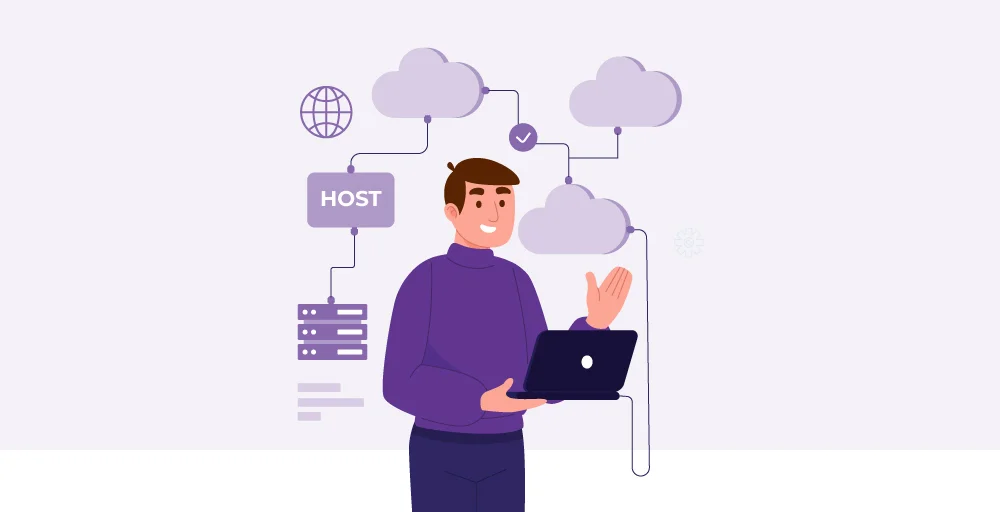
VoIP works by converting your voice into a digital format, compressed, and sent over the Internet so that you can listen as an outcome. However, the calls are set up by a VoIP provider (just like your internet provider sets up your internet service).
Then, during a phone call, your conversations are exchanged through small data packets. These data packets can be sent around the world in less than a second using the Internet. For internet telephony, these packets travel between your phone and a VoIP provider and then to the receiver.
The basic steps are as follows:
- Your phone connects to your switch or router in your Local Area Network (LAN).
- When you dial a telephone number, your IP phone tells your VoIP service provider to call the other party.
- Your VoIP service establishes the call and exchanges data packets from your IP phone.
- Your VoIP phone converts these digital signals into the sound you can hear.
History of VoIP
VoIP has been around since the mid-1990s when the first Internet voice applications were developed, and they enabled voice communications over the Internet. However, in 1995, VocalTec launched the first recognized VoIP software known as InternetPhone which was capable of converting analog voice signals into digital format to be used in the Internet.
Over two decades ago, VoIP was more expensive and required proprietary equipment. However, as of now, VoIP is based on open standards such as Session Initiation Protocol (SIP) calling. With SIP, desk phones, conference phones, and VoIP applications are fully interoperable.
This technology changed over time with the advancement of Internet bandwidth and compression technologies, thus enhancing voice quality and stability. Furthermore, in the early 2000s, VoIP was widely used by both businesses and consumers due to its cost-effective solutions and additional features. Since then it has become a mainstream communication since the popularization of broadband Internet.
And as of now the use of Voice over Internet Protocol has nearly replaced traditional telephone services. Furthermore, a VoIP connection can be used wherever you have a broadband connection, such as a DSL, cable, or fiber connection. It’s a major upgrade from an analog phone system.
VoIP Vs Landlines: What is the Difference?
Instead of using old-fashioned copper wires, VoIP makes calls using your internet connection, allowing for effective and efficient conversations. Plus, it’s super easy to set up and manage. Unlike traditional phone systems that require technicians and bulky equipment, VoIP runs on the cloud. This means that users can be added or removed with a quick software change – no hassle at all!
Furthermore, VoIP has been a main source for many Businesses. If you’re looking for cost-effective solutions, scalability, flexibility, mobility, advanced features, and integration with other systems, then you must consider switching from traditional phones to VoIP. Additionally, it offers superior call quality and tons of features, all without the hassle and expense of installing a complex PBX system on-site.
Advantages of VoIP
Whether it’s for an organization or an individual, utilizing VoIP can benefit you in many ways. In any case, some of the common pros you can get are mentioned below.
- Advanced features: Some of the advanced features include auto attendants, call recording, call queues, VoIP numbers, and so on. Businesses can install this add-on at a reasonable price.
- Fast deployment: You only need an internet connection and a softphone or handset to set up.
- Remote accessibility: There is no need to have a technical setup, and you can use your phone service wherever you go or work.
- Lower pricing: It saves 50% of a call cost with internal and internet calling. It also reduces repair costs and on-site maintenance costs too.
- High-quality sound: The high internet connectivity allows you to have an HD call quality. However, you should check for potential network issues.
Disadvantages of VoIP
The main drawback of VoIP is that it highly relies on internet connections. So, if you’re thinking of VoIP, make sure to check your internet connections. But you dont have to worry if you have a high-speed broadband connection.
However, if you want to check the network speed and stability, then the best way is to use the VoIP quality test. It checks for potential issues with Jitter, Bandwidth, SIP ALG issues, Packet Loss, and Latency.
Additionally, these issues might affect your call quality. So, before using the services, it is crucial to check and fix any network problems early in the VoIP setup process.
Most Popular VoIP Features
When it comes to features, VoIP services come with many features that organizations can use to increase their productivity. Then again, let’s look at some popular features that most VoIP services come along with:
1. Auto attendant
An auto attendant is a feature that enables the business to set up the options that the callers hear after dialing the business. It allows you to forward the calls to the persons or departments able to answer a concrete kind of question. This means that all the VoIP components can be adjusted through a web browser. Thus, it is possible to alter them as many times as one wishes without having to visit the site.
As an example, it might appear like:
- If you want to proceed to the sales department, please press option 1.
- If you want to speak to someone regarding any other matter, please press option 3.
2. Unified communications
Unified communications is a single solution that integrates various communication techniques like instant messaging, voice, and video calls into one platform. Implementing VoIP with Unified communications capabilities presents opportunities to enhance internal communications within your business.
3. VoIP security and Call encryption
The Internet is not fully secure, which means it has many security issues. Every communication that takes place over the Internet should be secure. VoIP technology ensures that all calls and communications are encrypted both in transit and at the time of storage. No one can hear the conversation; only the details of the call, such as time and date, can be heard.
For instance, you are making a call to another employee in the California office. Incall logs, the time and length of the call are shown, but the actual conversation can not be viewed.
4. Mobile and desktop apps
VoIP telephone service can be accessed via mobile and desktop applications without using a dedicated desk phone. Furthermore, VoIP apps, as a unique feature, can be a perfect technology for sales representatives and technical specialists who travel from one place to another or remote employees who work in coffee shops and co-working areas. With these apps, people in a company can stay connected even when they are not at work.
How Much Does VoIP Cost?
The approximate price for VoIP is $10 – $30 per user per month. However, The cost of VoIP (Voice over Internet Protocol) phone systems varies depending on several factors, including the provider, number of users, and features included.
The cost savings are indeed significant when compared to a conventional telephone system or a premise-based PBX. VoIP has the remarkable advantage of being very affordable. This may be one of the most obvious advantages of VoIP over traditional telephone lines.
How to Choose a VoIP Provider?
As most providers offer fundamental VoIP functionalities, it is advisable to select the right VoIP service provider that fulfills individual needs.
For instance, a VoIP provider specially designed for small businesses would be best for small businesses that simply need their business phones switched to VoIP without any unique features. That can be done by number porting, which many reliable VoIP providers offer.
So here are some points to consider while selecting a VoIP provider.
- Call Quality and Reliability: Make sure that the provider offers a high call quality and maintains a steady level of service. It is, therefore, important to look for features such as high-definition voice and investigate to see how reliable they are.
- Cost and Pricing Plans: You should compare the pricing structures of different providers. Consider both initial setup costs and ongoing monthly fees and be aware of any hidden charges for additional features or international calls.
- Features and Flexibility: Determine what features you require, such as voicemail, call forwarding, call transfer, call barging, call whispering, or many more. Make sure the supplier has these qualities and the ability to grow to meet your increasing needs.
- Customer Support: Choose a service with strong customer support. Look for 24/7 availability and several contact ways, as well as evaluations, to ensure responsive and effective assistance.
- Security Measures: Select a service that can protect your communications from potential dangers by providing robust security measures like firewalls, encryption, and frequent upgrades.
VoIP Protocols and Standards
VoIP (Voice over Internet Protocol) client applications typically utilize either International Telecommunication Union (ITU) standard codecs or specifically developed codecs for communication. The key protocols and standards of VoIP include:
- G.711: This is the standard codec for transmitting uncompressed voice packets.
- G.729: This standard codec is used for transmitting compressed voice packets.
- Transmission Control Protocol (TCP): It breaks a message down into smaller packets for transmission.
- Internet Protocol (IP): It handles the sending and delivery of these packets.
- ITU T.38: This protocol is used to send faxes over a VoIP or IP network in real-time, supporting non-voice communications.
- Real-Time Transport Protocol (RTP): Once voice data is encapsulated into IP packets, RTP is used for its transmission.
- Secure Real-Time Transport Protocol (SRTP): This is the encrypted variant of RTP, ensuring secure voice data transmission.
- Session Initiation Protocol (SIP): SIP is a protocol that enables the creation, maintenance, and termination of calls.
- H.248 (Gateway Control Protocol): This protocol defines a centralized architecture for creating multimedia applications.
- H.323: A signaling protocol used to control and manage VoIP calls.
- Extensible Messaging and Presence Protocol (XMPP): This protocol is used for contact list maintenance, instant messaging, and presence information.
- Skinny Client Control Protocol (SCCP): A proprietary signaling protocol developed by Cisco.
- Session Description Protocol (SDP): This protocol is used for initiating and announcing sessions for multimedia communications and WebSocket transports.
Conclusion: VoIP is the Future
VoIP is a technology that connects people in an advanced way. So that is the main reason why when you move to Voice over IP, there is no comparison in terms of quality, cost, and options. This is the solution to all problems associated with telephone lines; it is a fast, efficient, and effective way of communicating.
Additionally, the future of the telephony system is upon us, and it is as vibrant as ever with VoIP. So, make sure you don’t miss out on this opportunity. Now, if you wish to switch to VoIP, you need to look no further, as you can opt to choose KrispCall. It is one of the most reliable VoIP systems and offers a complete set of VoIP features.
So, switch now and see KrispCall’s benefits firsthand. Book a free demo now!
FAQ
Are VoIP phone calls free?
Yes, VoIP phone calls can be free if both parties are using the same VoIP services or app. However, calling landlines or mobile numbers that are not using VoIP may incur a fee.
Are VoIP calls traceable?
Yes, VoIP calls are traceable through the helps of IP addresses which are used during the call and call, and service providers often keep logs of call metadata such as time, duration, and participants.
Can I use VoIP on my cell phone?
Yes, you can use VoIP on your cell phone. There are many VoIP apps, such as KrispCall available for both Android and iOS devices that enable VoIP calling. These apps use your phone’s internet connection (Wi-Fi or mobile data) to make and receive calls
Can VoIP receive texts?
Yes, many VoIP services can receive texts, also known as SMS (Short Message Service). Apps like KrispCall, Skype, Google Voice, and WhatsApp also allow users to send and receive text messages and make voice calls.

